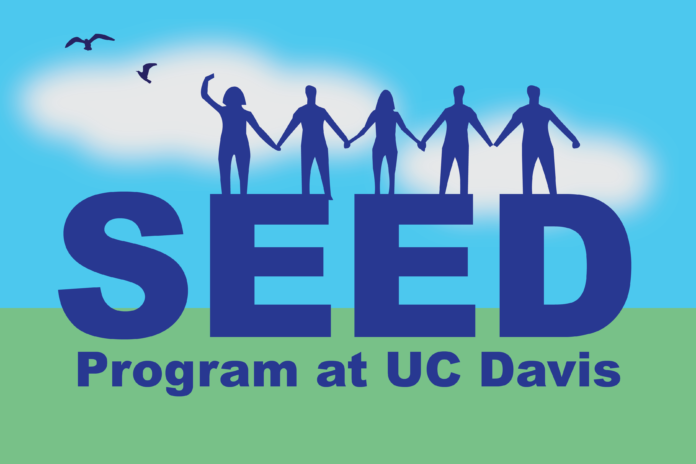The initiative has helped students with intellectual disabilities find community and acquire both life and job skills as they become independent
By AMBER WARNKE — features@theaggie.org
The Redwood SEED (Supported Education to Elevate Diversity) program is one of the newest disability programs at UC Davis. Designed to support students ages 18 to 23 with intellectual disabilities in life and job skills training, the organization began supporting its first students in 2021, with the oldest students in the program currently in their third year.
Students in the program live in on-campus dorms, are encouraged to join clubs and organizations and receive support from peer mentors. Ian Hutchings, a second-year SEED scholar, enjoys living on campus and the activities on campus. While he found it difficult at first to live so far away from his family, he enjoyed his experiences meeting new friends and participating in activities around campus.
“It’s fun here, hanging out with friends,” Hutchings said. “I’ve gotten to know a lot more people here…I love hanging out at the MU with my friends and seeing the football games… I belong here.”
Ryan Fitch, a third-year SEED scholar, has similarly made new friends and branched out through the program.
“I did miss my parents and brother Aiden, but it was actually really fun being here with my new friends,” Fitch said.
While some students found it “nerve-wracking” to transition to life on a college campus, many students come to love and enjoy living and learning as a community, according to Roshan Khandhar, a first-year SEED scholar.
“It was really scary, because it’s a big campus … the campus is about 5,300 acres,” Khandhar said. Once he adjusted, however, he found that it became a place where “everyone [was] welcoming,” calling it “a fourth home and family for me.” Now, he wants people to know that “special needs people are not alone and whether it’s in a private or a public school, there is a program that can help them thrive…There’s always a place for them, they’re not alone.”
In addition to focusing on relationship building, which the program does through offering classes in social and life skills, SEED scholars can also expect to be introduced to a variety of job opportunities around campus at the beginning of spring quarter of their first year.
As students adjust to their jobs, they move through what the program calls “Ladders of Opportunity,” which develop the stamina to work longer hours and more days during a student’s third and fourth years. Fitch works for Aggie Media as a photographer and used to work at UC Davis School of Veterinary Medicine as a videographer where he says they “gave me a checklist of things to do, so I did them.” His goal is to become a graduation photographer after he graduates.
Khandhar aspires to be independent and follow his passions in the future.
“I want to live in my own apartment near my parents. Once I’m on my own, I will buy my own gym membership,” Khandhar said. Khandhar is preparing to become a physical trainer for people with intellectual disabilities in his future, having experience in swimming, basketball, golf, soccer, baseball and softball.
Students in the SEED program take part in life-planning exercises, including brainstorming and preparing for future career choices. This is accomplished by assigning each year of students their own cohort, with whom they take “foundational, customizable courses as well as credit-bearing UC Davis courses in their areas of interest,” according to the UC Davis website’s information page on the program.
Over the course of four years, these programs, courses and opportunities can have a lasting impact on a student’s career potential. One 2020 study found that 59 percent of students with intellectual disabilities who went through a Transition and Postsecondary Program for Students with Intellectual Disability, which the Redwood SEED program is defined as, were employed a year after graduation. The same study contrasts that number with 19 percent of their peers who did not go through this program. Currently, only 263 of the nation’s more than 4,700 degree-granting institutions offer programs for students with intellectual disabilities, according to an article by The Atlantic.
In addition to raising awareness of the SEED program and its benefits to people with intellectual disabilities, UC Davis students can help support the program by applying to work as mentors. The SEED program currently employs over 100 UC Davis students as mentors in five areas: academics, social inclusion, health and wellness, employment and residential housing.
“There’s always a spot to help, to be a mentor in the program,” Hutchings said.
Written by: Amber Warnke — features@theaggie.org










